MARCH 2023
More than sixty years of sharing the life & story of the Mennonite Brethren in Canada


MARCH 2023
More than sixty years of sharing the life & story of the Mennonite Brethren in Canada

VOLUME 62, NO. 3
COLUMBIA BIBLE COLLEGE STUDENTS FIND SNOW IN PARADISE
HOLY SPIRIT—FILL US WITH YOUR JOY!
FREEING UP TIME FOR YOUR MOST MEANINGFUL WORK
Q: How do you speak well about marriage with your neighbours, knowing that marriage can be difficult?
A: Check out the Faith and Life online pamphlets about marriage and family. www.mennonitebrethren.ca/ nflt-resources

Mennonite Brethren Herald Digest is digitally published monthly by the Canadian Conference of Mennonite Brethren Churches, primarily for the use of its members, to build a Canadian MB community of faith. We seek to 1) share the life and story of the church by nurturing relationships among members and engaging in dialogue and reflection; 2) teach and equip for ministry by reflecting MB theology, values, and heritage, and by sharing the good news; 3) enable communication by serving conference ministries and informing our members about the church and the world. However, the opinions expressed here are not necessarily those of the church as a whole.
MARCH, 2023 | VOLUME 62, NO. 3
EDITORIAL OFFICE
1310 Taylor Avenue
Winnipeg, Manitoba R3M 3Z6
Phone: 204-669-6575
Toll-free in Canada: 888-669-6575
MBHERALD@MBCHURCHES.CA
WWW.MBHERALD.COM
ISSN: 0025-9349
The Mennonite Brethren Herald is a publication of
6 8
CANADIAN CONFERENCE OF MENNONITE BRETHREN CHURCHES CONFÉRENCE DES ÉGLISE DES FRÈRES MENNONITES
Sharing the life and story of Mennonite Brethren in Canada
From left, Juana Alicia Ruíz Hernández, Alexandra Valdez Tijera and Julia Ramirez of Mampuján, Colombia, illustrate their experiences with violence on quilts after women in the community had honest conversation about the violence they and their ancestors had experienced.
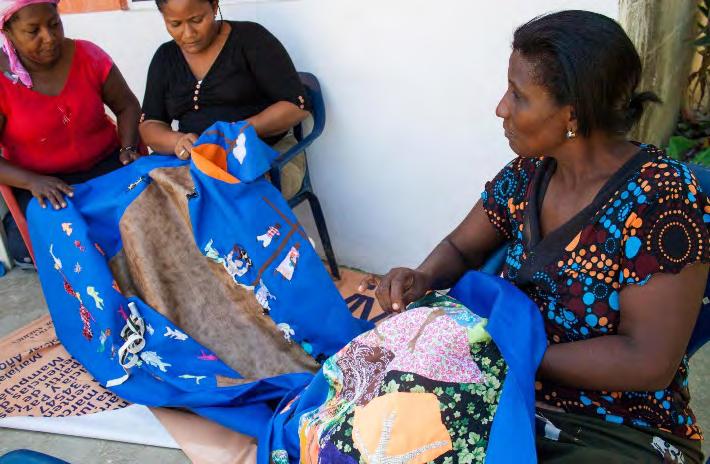
MCC PHOTO/ANNA VOGT (2012)
Read more on page 4.
BOOK REVIEW LETTERS TO MY FRIENDS
Harold Jantz
HOLY SPIRIT—FILL US WITH YOUR JOY!
Karen West
16
BEAUTY FROM ASHES
Karen Esau
12 FREEING UP TIME FOR YOUR MOST MEANINGFUL WORK
Bonita Eby
FACEBOOK.COM/MBHERALD TWITTER.COM/MB_HERALD SOUNDCLOUD.COM/MBHERALD MBHERALD.COM
Over the last few issues, you may have noticed a focus on women in leadership features. This month, we present Karen West, Pastor Emeritus, at WMB church in Waterloo, Ontario. Karen describes overcoming challenges she and her husband faced in adopting a child and how their faith in God during this time and in the years ahead shaped her for leadership in the church. This piece, written by first-time contributor Karen Esau, is on page 12
Karen West is the author of this month’s “Moment in prayer.” If you don’t already subscribe to the MB Herald Digest, doing so will give you early access to the monthly prayer guide via email on the first of the month.
Bonita Eby returns this month with six essential questions designed to help you free up time for your most meaningful work.

We’ve also included a portion of the new introduction to the MB Confession of Faith. Over the following few issues, we will unpack this in detail and introduce a way to submit your questions and input to be responded to by the National Faith and Life team.
Lastly, we want to bring your attention to a significant event we, as a staff, had the privilege to share earlier this morning: Long-time member of the finance team, Karen Alvarez-Diaz, her two daughters and husband (who participated from his workplace in Alberta), were affirmed as Canadian citizens. Celebrating this milestone with Karen and her family is an honour. Thank you, Karen, for allowing all of us to be a part of it!

 CARSON SAMSON Communications director
CARSON SAMSON Communications director


Almost the whole movie Women Talking takes place in a barn. Women, sitting on hay bales, talk about how to respond to terrible violence.
When I enthusiastically describe the film’s premise to my friends, they roll their eyes. Director Sarah Polley calls Women Talking a “fable” or an imaginary response to real incidents of sexual violence in Low German Mennonite colonies in Bolivia. Why would we want to watch something that seems to be equal parts boring and horrific?
When I saw the film, I didn’t see a fable. To me, it was far from imaginary. Rather, I saw the story of countless communities and groups I have been honoured to know, coming together to decide how to respond after unimaginable violence—not only imagined, but real and enacted. I walked out of the theatre mulling about themes
of forgiveness, faith and nonviolence, and how those themes show up in my own life.

My mind wandered back to the years I spent in Mampuján, Colombia. On occasional lazy days, when it was too hot to do anything but chat, I would sit under a shade tree with my neighbours and community leaders, talking about life. Most of the time, it was about the ordinary stuff that consumed our days: how the crops were doing, the latest church gossip, a funny anecdote about someone’s kid.
Every so often people would talk about the past: the horrors of la violencia and the agonizing choice about whether or not they would forgive the men who had ordered their displacement. Many of those conversations happened as the women of the community gathered to talk and share their stories.
>> Read the full story on MBHerald.com
When students from Columbia Bible College (CBC) in Abbotsford, B.C. signed up to volunteer with Mennonite Disaster Service (MDS) in Paradise, California in mid-February, they were anticipating sun and temperatures in the mid-teens Celsius (high 50s Fahrenheit) along with some hard work.
They weren’t expecting snow.But that’s what they got February 24 when a winter storm hit the state, dropping snow as far south as Los Angeles. About a 30 centimeters/one foot of snow fell in Paradise, where they were responding to help people affected by the 2018 Camp Fire.
Before the snow hit, the students worked on several houses, putting on a complete roof, putting up siding, installing kitchen cabinets, painting trim, and digging a few holes.
The storm gave the students a snow day on Feb. 24, giving them time to play in it and rest from their work.
Henry Zukowski is chaplain at CBC, which is jointly operated by Mennonite Church B.C. and the British Columbia Conference of Mennonite Brethren Churches.
For him, “it was a great week. We were very much blessed by the MDS Project Directors, Crew Leaders and the cooks who fed us exceptionally well.”
“Everyone on our team would agree that it was a very good week and felt good about contributing to the rebuilding of this hard-hit community. We look forward to a continued partnership with MDS.”
Also on the trip was Bryan Born, President of CBC. “The trip was a great opportunity to connect with students as we spent time working, travelling, eating and socializing together,” he said.
It was also a great way for the group to meet Mennonites from other denominations. “It was fun to connect with them and learn about them,” he shared.
Like the students, Born said he was “not overly skilled” when it came to construction. “But everyone worked hard,” he said, adding they got great support and direction from MDS Crew Leaders.
“The students did things they had never done before,” he said, noting he was impressed by how hard they worked.
A highlight of the trip was meeting one of the homeowners and to “hear the story of his harrowing escape from the fire in his truck with his dog,” Born said.
As for other Mennonite colleges and universities, Born would encourage them all to consider taking students on a service trip with MDS.
“MDS makes it so easy,” he said, taking care of accommodations, food, program and providing expert direction.
He would also encourage presidents from other colleges and universities to consider going on such a trip.
“I had lots of really good conversations with students while we served together and learned together,” he said. “It was great to be with them in a different environment and connect on a deeper level.”
MDS, he said, “is an important partner for CBC.” —MDS CANADA COMMUNICATIONS
2023 PROVINCIAL ASSEMBLIES AND CONVENTIONS
ONMB Convention
February 24-25
MBCM Assembly
March 3-4
AEFMQ Convention
March 21 & 25
SKMB Assembly
March 24-25
ABMB Convention
April 14-15
BCMB Convention
April 28-29
Pastors Credentialing Orientation ICOMB
THE MEETING PLACE •WINNIPEG Register at pco.mennonitebrethren.ca
International Community of Mennonite Brethren
SAVE THE DATE FRIDAY, MAY 5, 2023
TRAINING NATIONAL LEADERS: EQUIPPING OUR PARTNERS FOR CHURCH AND MISSION
ICOMB (International Community of Mennonite Brethren) invites you to participate in a fundraising event for the global MB Church. This dinner event with international speakers will be at a venue in Abbotsford, BC. Full information will be available in early April.
Consider joining us and investing in the next generation of leaders in our global MB family.
LETTERS TO MY FRIENDS , A WORK OF 320 PAGES, WAS WRITTEN BY PHILIP A. GUNTHER AND WAS PUBLISHED IN 2022 BY KINDRED PRODUCTIONS OF WINNIPEG.
 REVIEWED BY HAROLD JANTZ
REVIEWED BY HAROLD JANTZ
Phil Gunther has become a wellknown figure to readers of the MB Herald online and many in his home province of Saskatchewan, where he was for many years the pastor of the Parliament Community Church of Regina and now serves as Director of Ministry for the province’s MB Conference. He is married to Janine Renee Emch and together they are parents to three married sons. In Letters to my Friends, Phil sets out to write words of encouragement, especially to those who like himself have given themselves to public—mostly pastoral—ministry.
In Letters to my Friends, Phil gives us seven weeks of readings, one for each day of the week, touching on a range of themes and always with the intention of offering hope and encouragement from deep faith that God walks alongside us. Many of the

themes will resonate far beyond the setting in which Phil has done his writing.
I liked Phil’s humility and vulnerability most about his writing. There is no sense of someone removed either from tough experiences or disappointments. After a particularly hard year in 2020 he writes, “I feel I have good grounds to claim that 2020 was cursed.” But that was not how he assessed it in the end. It was lived not only “under the sun,” but also “under the Son” and that brought “grace, hope, peace and joy.” He experienced that keenly as he went through a serious illness and lay in the hospital alongside a patient who was there for similar reasons but without God. Phil could become the presence of God for the man.
Phil’s letters treat living in a confusing world, gaining resilience, recognizing our fragility, responding to trouble, slowing down, the importance of love and of time, life editing (or decluttering), finding balance, learning contentment, bold benevolence and much more—you get the idea. He has thought about many of the themes that arise in all our lives and he has learned a great deal of the wisdom that might help us negotiate them. He always writes as a disciple of Christ.
There is an attractive grace about Phil’s letters. He says he writes and then wordsmiths what he has written. His letters show the care he exercises. A letter on prayer has the following passage:
“Priest and theologian Saint Ignatius of Loyola wrote, ‘Before all contemplations and meditations, there ought always to be made the preparatory prayer.’ During times of significant searching, wanting direction and discernment from God, I commit myself to times of listening—a most essential component of prayer. I adhere to the counsel of Loyola and carefully prepare my heart and soul. I need to center my whole being to one task, listening to the still small whisper of God.”
That spirit is everywhere to be found in Phil’s book. He wrote it with the encouragement of staff in the conference office and of Kindred Productions, who published it. Each letter has a page of space for the reader’s own reflections—encouragement to practice or comment on what was written. Many references indicate Phil is a reader of other wise counsellors. This book will nourish the spirits of those who pick it up and spend time with it.
HAROLD JANTZ by Philli P A. Gunther
or the month of March, our prayer focus is for the Holy Spirit to fill us with Joy! This is the second quality in the fruit of the Spirit list we find in Galatians 5. The biblical concept of joy, as expressed through the Hebrew word simchah and the Greek word chara, involves something more than the quest for ‘happiness’, which our secular world calls us to pursue.
Throughout scripture, simchah/chara-type-joy, rather than being found through our own quest or effort, is described instead as a gift to be received from God in all circumstances, even the difficult ones. That means the source of joy is not based on the conditions of life, and neither is it based on our effort, or our merit! It’s based solely on HIM! Joy comes not as we seek health, or wealth, or good feelings, but instead as we seek the presence of Jesus in our very beings, as we trust him with our circumstances (both good and bad), even in the midst of a very broken world. This is good news! Because life is full of ups and downs, of highs and lows. BUT our joy doesn’t need to follow that roller-coaster trajectory, such as happiness does. In momentary times of trouble, fear not! Jesus longs to carry us through. He sends the Holy Spirit to fill us with joy, not as a means to mask how we feel, but to hold us fast, regardless, even as he works to redeem all things, for our good! Joy shows the world that, with the Holy Spirit, Jesus enables us to both triumph and thrive, no matter what comes our way!
“SPLENDOR AND MAJESTY ARE BEFORE HIM; STRENGTH AND JOY ARE IN HIS DWELLING PLACE.” (1 CHRONICLES 16:27)
“THE LORD IS MY STRENGTH AND MY SHIELD; MY HEART TRUSTS IN HIM, AND HE HELPS ME. MY HEART LEAPS FOR JOY...” (PSALM 28:7)
“YOU TURNED MY WAILING INTO DANCING; YOU REMOVED MY SACKCLOTH AND CLOTHED ME WITH JOY...” (PSALM 30:11)
“YOU HAVE MADE KNOWN TO ME THE PATHS OF LIFE; YOU WILL FILL ME WITH JOY IN YOUR PRESENCE.” (ACTS 2:28)
“NOW MAY THE GOD OF HOPE FILL YOU ALL WITH JOY...” (ROMANS 12:12)
CONSIDER THE TEXTS LISTED ABOVE:
˚ Notice the reference to Joy in God’s dwelling place… where he is close, where he is present, where we can choose to go when life is both easy, and hard.
˚ Imagine the feeling of a heart leaping for joy! Notice that the ‘leap’ comes after the declaration of the Lord as the writer’s strength and shield, and is felt in a heart ready to trust in him, no matter what.
˚ See that God turns wailing into dancing as HE clothes us in joy!
˚ Consider joy as coming from a source beyond ourselves, as we have first placed ourselves in God’s presence. Note the wisdom promised for the path of life through this connection.
˚ Notice the link between the gift of joy and the birth of hope in us, as well… a hope that is so abundant that it overflows to others.
PRAY WORDS OF INVITATION AND WELCOME TO THE HOLY SPIRIT FOR YOUR OWN HEART:
˚ Welcome Holy Spirit! Come and fill me today!
˚ Welcome Holy Spirit! I welcome you into my innermost being! By your presence, birth in me a triumphal joy, which isn’t hindered by life’s circumstances, but draws me to thrive deeply in you, even in spite of them.
PRAY WORDS OF INVITATION AND WELCOME FOR THE CHURCH:

˚ Welcome Holy Spirit! May the thriving, triumphal JOY of Jesus overflow out of my heart into worship!
˚ Welcome Holy Spirit! May this contagious JOY of Jesus overflow out of my heart upon
_________ today! (Repeat this with specific names of those in your sphere of influence; those who will identify with the struggles of life, but will be mystified by the concept of JOY in the midst of them.)
˚ Welcome Holy Spirit! May this JOY of Jesus overflow out of my heart and birth a transformational hope within God’s struggling world, cultures, creation!
˚ Welcome Holy Spirit! May this JOY of Jesus’ presence carry me through the trials and struggles of my own life, particularly in these circumstances (openly name your situation) so that I might overflow with hope, and authentically thrive in YOU, no matter what.
˚ Welcome Holy Spirit! May the world notice the difference you make, as your Church collectively lives with a JOY that knows no bounds. AMEN!
The National Faith and Life Team (NFLT) is tasked with providing resources related to the MB Confession of Faith. These resources are to clarify our Confession of Faith, but the larger goal is to encourage greater spiritual health and theology in our MB family. Without a shared understanding of our MB Confession of Faith—its vision and unifying purpose—local churches and leaders could easily move in directions further and further away from our MB missional DNA.
As part of that task, the NFLT have approved in principle a significantly revised introduction that replaces the existing “Nature and Function of the Confession of Faith” document. This new introduction responds to common questions that have emerged within our Canadian MB family that have not been addressed clearly elsewhere.
In the next few months, we will be including key sections of this new introduction here in the Herald with the hope that it will be read widely. (The full version is posted online here)
If you have feedback and/or questions related to this revised “Introduction to the MB Confession of Faith,” please send them to listeningwell@mbchurches.ca
Thank you for your participation in this project.
Ken Esau CCMBC National Faith & Life Directormade humans, male and female, in the image of God to live in fellowship and to be stewards of creation. Humans abused their freedom by rebelling against God in disobedience, which resulted in alienation and death. In the rebellion against God’s rule, the evil powers of Satan, sin and death claimed control of the world.
God, the Deliverer, acted to establish a covenant people, beginning with Israel. God purposed to form the covenant community to live in relationship with God, to experience God’s blessing, and to serve as a light to all nations. Through the prophets God communicated his law and purposes, expressing that God is forever faithful, just, righteous, with a father’s tender mercies, and a mother’s compassion. God promised the hope of a new creation.
God the Father sent the Son, Jesus Christ, to the world born of the virgin Mary. Jesus inaugurated the reign of God, proclaiming repentance from sin, announcing the release of the oppressed and good news to the poor, and calling disciples to follow his way as a new community. Jesus responded to the violent evil powers by taking the cross in order to die for the sins of the world and reconcile creation to God. Jesus gained victory over sin, death, and Satan as God vindicated Jesus by raising him from the dead and exalting him to God’s right hand where he intercedes for the saints and rules forever.
At Pentecost, God sent the Holy Spirit, who had acted in creation, in empowering the prophets, and in inspiring the Scriptures. Through the Spirit, God established the church, the body of Christ, to proclaim God’s reign and to give witness to the new creation. The Spirit is poured out on all who receive Christ, baptizing them and sealing them for redemption as God’s children. All who believe and confess Jesus as Lord are born anew into Christ. Believers are baptized by water into the new covenant community in the name of the Father, the Son and the Holy Spirit. By grace they are saved through faith to live out God’s peace and love in the face of opposing circumstances.
The church is God’s new creation, agent of transformation, called to model God’s design for humanity. The people of God call everyone to repentance and conversion, seek to promote righteousness, are faithful in suffering, share generously with those in need. They act as agents of reconciliation to reverse the alienation brought on by sin. In the Lord’s Supper the church proclaims the Lord’s death and celebrates the new covenant.
Canadian Mennonite Brethren believe that the Bible, from Genesis 1 to Revelation 22, is telling the Triune God’s grand and beautiful story of redemption, healing, and renewal for all creation.
Canadian Mennonite Brethren are part of an international Mennonite Brethren family who together share the following biblical-theological vision for what the Triune God has done, is doing, and will do in our world. The following is Part 1 of the shared Confession from the International Community of Mennonite Brethren (ICOMB):
God, the sovereign Lord of all, created the heavens and the earth through his powerful word. God
The new creation will be completed when Christ returns. All who belong to Christ will rise with a new body while Satan and those who have rejected Christ will face eternal condemnation. The new heaven and new earth will live under God’s rule in everlasting peace and joy.1
The Canadian MB Confession of Faith with its 18 articles needs to be understood with God’s love expressed through his Kingdom story of redemption and restoration constantly in the background. This is God’s Kingdom story that reaches its peak with Jesus’ incarnation, life, death, bodily resurrection, ascension, and final return (Acts 20:25; cf. 1 Corinthians 15). First, we proclaim that Jesus has broken the chains of death, sin, and Satan and is now the rightful King over the world (Matthew 28:18; Philippians 2:6-11). Second, we proclaim that every human on earth needs reconciliation with God through Jesus whose substitutionary death and victorious resurrection are the path to grace, forgiveness, new life, and welcome into God’s family (Acts
20:24; Romans 4:25). Finally, we also proclaim that in Jesus’ incarnation, life, teaching, death, and resurrection, we have been given a model for how to live in the way that God intended for humanity (Matthew 5-7) and to participate in a community that lives out God’s reconciliation and justice in the world (Luke 4:18-19; 2 Corinthians 5:18-21). God’s Kingdom story includes all three aspects of what Jesus has done for us and for all creation.
Each of the 18 MB Confession articles is declaring part of God’s amazing Kingdom story which makes all the articles inextricably linked with each other. The 18 articles describe the loving, righteous, and holy character of the Triune God revealed to us through both Scripture and creation (Articles 1-3); God’s actions of forgiveness, salvation, and restoration through Jesus (Articles 4-5); the important role of the people of God in that Kingdom story (Articles 6-9); discipleship living in the way of Jesus by the power of the Holy Spirit (Articles 10-16); and God’s future purposes for redeemed humanity and creation (Articles 17-18).
We have articulated our theological and ethical convictions in our MB Confession because we believe that they are an accurate picture and a faithful road map for us about what it means to follow Jesus and be the kind of people of God we believe Jesus is calling us to be. Often Mennonite Brethren are characterized as being “evangelical Anabaptists”2 which describes our family as firstly and unashamedly “good news people” or “gospel people” which is the root meaning of “evangelical.”
The good news of Jesus’ life, death, and resurrection offers us grace, forgiveness, hope, adoption into God’s family, life eternal, and bodily resurrection into God’s new creation. We invite people from all nations to respond in repentance and faith to this divine invitation. We believe that being good news people is central to our faithfulness to Jesus’ teaching (cf. Matthew 28:19-20) and foundational to our identity as an MB family (see Article 7).
We are also unashamedly Anabaptist, which identifies us with a long tradition of churches centred on and seeking to live daily into greater obedience to Jesus. By means of the filling of the Holy Spirit (Ephesians 5:18; Galatians 5:22-23) and the power and character that the Holy Spirit produces, we seek to be the kind of faithful community demonstrating sacrificial discipleship that we find in the book of Acts. There are at least two significant implications of this Anabaptist heritage. The first is that we value practical and costly discipleship in the way of Jesus. Articles 10-16 describe this day-to-day path of discipleship, and these articles
are not an afterthought or an appendix to our Confession of Faith. The second is that we understand discipleship as necessarily lived in the context of a Jesus-worshipping church community. Discipleship is not a solitary walk with Jesus. The church community does not gather merely to assist individual disciples in their spiritual growth, but it gathers to be the signpost of God’s Kingdom on earth drawing people to Jesus until he returns. Articles 6-9 speak about the nature, mission, and ordinances of the church. We believe that being committed to practical and costly discipleship in the context of healthy Jesus-centred and Kingdom-focused church communities is essential for being good news people and part of our fundamental identity as an MB family.
Our identity as evangelical Anabaptists has implications for how we read and understand the Bible. The entire Bible records God’s big Kingdom redemption story. We affirm that the Triune God speaks with authority to us in both the Old and New Testaments, which means that both provide theological and ethical guidance for us today. 3 The Old and New Testaments are “God-breathed” (2 Timothy 3:16), that is “inspired by God through the Holy Spirit” (cf. 2 Peter 1:21; Article 2). However, we affirm that “God revealed Himself supremely in Jesus Christ” who brings “continuity and clarity to both the Old and New Testaments” (Article 2). Our MB Confession of Faith points to Jesus, his call to make disciples who follow him with their entire being, and his transformative and hope-filled vision for the world that culminates with Jesus’ return.
We hold our theological and ethical convictions because of the great love that God has lavished upon us through Jesus (cf. 1 John 3:1) who invites each of us to be part of his Kingdom story (Luke 6:20; Hebrews 12:28; James 2:5). Behind every article is God’s reconciling love for the world and how we are called to respond to that love by loving God faithfully and loving our neighbours as ourselves (cf. Mark 12:30-31). As we explore the 18 articles of the MB Confession of Faith, let us keep Jesus in focus and God’s grand and beautiful redemption story in sight. This vision provides the context and the motivation for understanding and living out our convictions.
1 https://www.icomb.org/what-we-believe/
2 For further insights into the meaning of “evangelical Anabaptist,” see Bruce L. Guenther, “Reflections on Mennonite Brethren Evangelical Anabaptist Identity” in Renewing Identity and Mission: Mennonite Brethren Reflections After 150 Years (Winnipeg: Kindred Productions, 2011), 47-82.
3 MB Confession of Faith: Article 2 notes that “We accept the Bible as the infallible Word of God and the authoritative guide for faith and practice.”
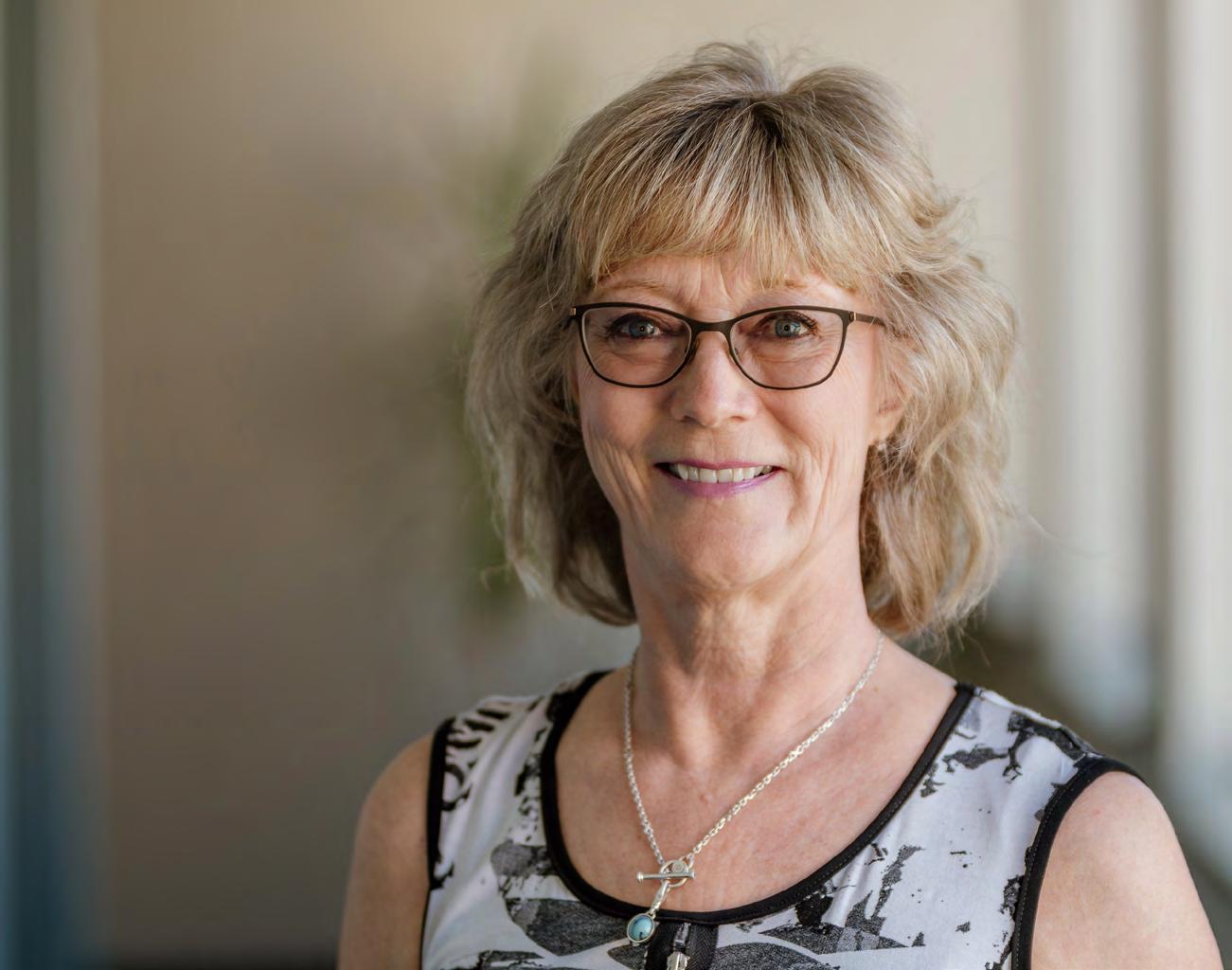 KAREN WEST
KAREN WEST
Karen West grew up in a mainline Christian church where faith was a very private thing. Over her years there, she understood Jesus to be a good moral teacher, but not a Saviour. “Jesus was who you needed him to be and Scripture was interpreted to fit your cultural expectations and your environment.” For this reason, there was very little concern for real discipleship or for sharing about Jesus. It was a “convenient faith.”
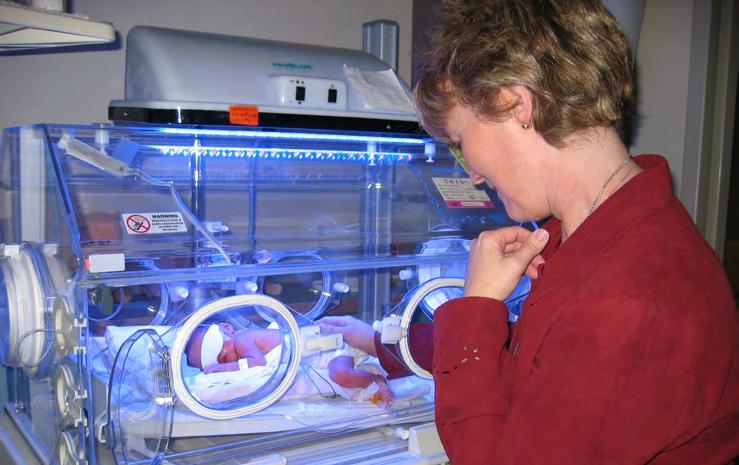
She and her husband married young, and soon found they could not have children. They decided to pursue adoption, and were eventually blessed with a newborn baby boy. Delighted, they welcomed him home at 10 days old, and lovingly cared for him. However, after only three weeks the 15-year-old biological mom changed her mind and wanted her baby back. At this time, the legal system allowed the biological mom exactly three weeks to make her final decision. Karen and her husband were devastated when the baby was taken back from them. Though they struggled with the meaning of it all, and how God could allow such a thing to happen, they continued to pursue adoption.
About one year later, another infant boy became available for adoption. But this time, because of their previous painful experience, it was decided that he would go to a foster home during the legal wait time. Over the next three weeks, the Wests got to know the baby during their daily visits to the foster home. The foster mom turned out to be a vibrant Christian, vocal in her faith and trust in Jesus. She prayed for them and hoped for them, encouraging them every time they visited. Seeing this kind of overflowing faith was a new experience for Karen. And then, history repeated itself. When the baby turned three weeks old, this biological mom also changed her mind and decided to keep him.
Once again, the Wests found themselves journeying through crisis and heartbreak. They cried out to God, vulnerable. The foster mom also prayed for them and spoke in faith, saying that, as she spent time in prayer, she truly believed the baby boy would still come to be theirs in the days ahead. She called them daily, to pray and tell them to have faith, because God’s plan is good! Karen confesses that she didn’t want to get her hopes up. She just wanted to move on. The foster mom challenged her, “Your faith has to be what God wants for you, whatever his will is. He’s going to carry you to that point.”
What she learned at this time about enduring hope in the midst of struggle and crisis, is what Karen calls the “thread of God’s voice” in her life. “Vulnerability and brokenness, if lived out honestly and not hidden, become something beautifully redemptive that God gets invited into,” like a crack in our facade, “to change our difficult struggles and mold them into something beautiful. He gives us beauty from ashes. If we resist or try to put on a false front like we have it all together, then that redemptive space is somehow minimized or lost.” This thread followed her throughout the rest of her life and profoundly informed her later ministries.
Two months later, the biological mom went to court to give her baby up, realizing that she could not care for him. The Wests finally welcomed home this beautiful baby boy. Through the foster mom’s dynamic witness, encouraging them to see God and have faith and hope in their moments of crisis, Karen’s faith changed and grew. She finally saw Jesus for who he truly is –the One who holds all things in his hands, and whose redemptive power knows no ends. That was a huge turning point. She started volunteering more in church. She was excited about Jesus and knew that others needed to know who he is, too! Her faith could no longer be quiet and privately held.
We often perceive that God is not there in the crises. He doesn’t create troubles but God is there, using them, nonetheless.
teaching team. In a transition time between lead pastors, she also served as co-interim lead pastor at WMB. Beyond her ministries at WMB, Karen served as moderator of the ONMB Board for 7 years and was also on the CCMBC Executive Board during that time. Now, she’s retired from pastoral ministry at WMB, who have recognized her with the title Pastor Emeritus. Her leadership roles still continue as she serves on the Ontario Faith and Life Team and is the ONMB Representative to the National Faith and Life Team.
A few years later in 1997, the West family, including two adopted children, now in grades two and four, moved from London, Ontario to Waterloo. They were looking to join a Christ-centered, gospel-oriented Christian community, rather than looking for a certain denomination. When they ended up at WMB Church, their first question was—what does ‘Mennonite Brethren’ mean? The lead pastor gave them a copy of the Confession of Faith. Karen found it so helpful to have this in hand and to go back to it as questions arose. It defined for her what the Mennonite Brethren believed, which resonated so deeply in her heart.
At the time of their move to Waterloo, Karen was a paralegal secretary. In response to the thread of God’s voice through their earlier struggles, she decided to go back to school to pursue her Bachelor’s of Religious Education in Pastoral Studies. Later she went on to get her Master’s of Divinity at Tyndale Seminary (Toronto) as part of an in-ministry program where for 3.5-4 years, she joined an in-person cohort all day every Wednesday. She remembers this as a very formative experience. WMB Church hired Karen as a part-time pastor while working on her BRE, and then invited her to serve full-time during her years in M.Div. studies.
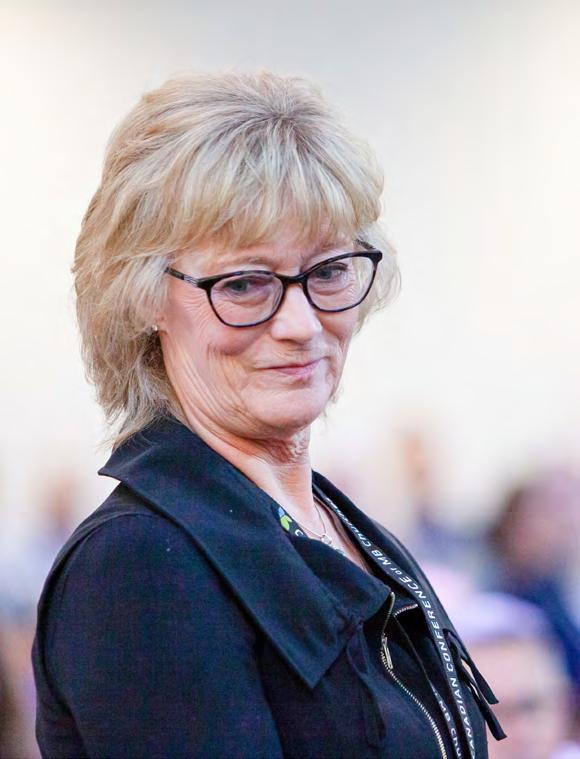
Karen’s list of leadership roles is extensive. She started at WMB working with small groups. Later, the majority of her pastoring role was in community care and connections. She worked with a team of others to oversee pastoral care, and to help with weddings, funerals, care, meals, and outreach teams. She also oversaw the team leading WMB’s Barnabas Missions, an outreach to marginalized people in their church and community. Karen later served on WMB’s Senior Leadership Team, and the preaching/
When Karen speaks of her experiences as a leader at WMB, she highlights when she saw the thread of God, woven through the voice of the foster mom, of hope in the midst of crisis, and of redemption in the midst of vulnerability. She observed how faith, lived out through the thick and thin of life in community care and in crisis, became such a vital witness. Hard circumstances like severe illness, or the everyday stresses and struggles marginalized people overcome became opportunities for God to work. “Something beautiful happens and others notice [this faith] as authentic witness.”
Even something so simple as a meal taken to a family in hospital so they have something to eat as they sit with their sick infant, becomes an opportunity to show hope to others who observe the meal shared, the love shared, the prayer and hope shared.
“This is the church’s powerful witness,” Karen says. “We often perceive that God is not there in the crises. He doesn’t create troubles but God is there, using them, none-the-less. People identify with struggle, whether Christian or non. What non-Christians can’t identify with, though, is the hope that we have as Christians, even in the middle of the hardships. That hope is what they want and need.”
When Karen reflects on the more difficult aspects of her ministry, she admits that her role as a woman in
leadership was not always easy. In Karen’s case, at the beginning of her time at WMB, she was the only woman at the table. “Stepping up into a man’s world was terrifying.” During this time, she realized she had to rely on these men, already in established leadership positions, to make space for her and others for whom this opportunity does not come easily. In her case, she feels overwhelmingly blessed to have been surrounded by such a great group of men at WMB Church and within the ONMB Conference, who fully believed in her, advocated for her, and affirmed her in the many different roles she came to inhabit. Their self-sacrificing support made her think a lot about leadership and privilege and how we use them, and to acknowledge her own privileged state.
As a result, she saw her leadership not as a means to further establish herself, but as an opportunity to encourage and affirm others toward leadership as she had been. And so, as she grew into her roles, she made room and advocated for the next generation of men and women leaders. Today, WMB enjoys a mix of men and women in leadership and she hopes that these leaders will continue to ask the important question: How can I use my position to affirm and make room for people who want to serve Jesus in alignment with sound biblical interpretation, but who are marginalized or underrepresented?
Another difficultly occurred as Karen entered into leadership roles on the provincial and then national level. She found the MB’s mixed perspectives on women in leadership confusing and difficult. While she felt supported and empowered at her own church, on the provincial and national levels, local churches are free to make their own decisions about women’s roles in leadership. “How do you lead confidently, as a woman, when you know there are people who believe you’re disobeying God by leading?” she asks. She experienced incredible support in her board roles, but found the expectations of one group within the Conference so different from that of the other. “It’s our responsibility as a Conference to bring clarity. How can we position women fully, without clear support as a denomination?”

She shares a story of her own journey when studying at Tyndale, where she felt God’s identifiable thumbprint on his calling for her. At the beginning of the program, in a prayer assignment about her future ministry, she prayed that if God was calling her to preach and teach, then that’s what she wanted to do, but she did not want to be a stumbling block to others: “I did not want others to not be able to hear God because the message was coming from a woman’s mouth. I would rather step down than be an obstacle.” At the end of the four years of studies, when asked again to write out her prayer, she distinctly sensed God’s voice: “Oh Karen, my positioning of you in the pulpit as a female is by design. It’s a visible expression of my Good News – the Gospel – which IS for all people!
The priority most needed by CCMBC today, Karen believes, is to be a clear and unapologetic witness to who Jesus is and what it means to be a disciple. She sees all of this clearly outlined in our Confession of Faith. “This is what we believe, communally discerned over decades, regardless of geography. The Confession is a discipleship tool and should be used to be a means of witness of
But Karen admits that right now, not everyone agrees about our Confession of Faith, and this distracts us from our mission. Not knowing what we believe means we’re not unified in our witness. “We’re focusing on disagreements and not having the conversations we’d like to on how we reach the world.” But it’s not simply a matter of pretending we don’t have differences. “We need to have unity in what we believe as far as what Scripture says. Our common interpretation of Scripture is a really important structure for birthing mission.” That is one of the reasons why Karen serves on the NFLT. “I just think we have to do that tough work with the application of our Confession and remember our shared convictions. What do we believe a life with Jesus looks like?”
In the end, Karen will always remember how she was transformed by the powerful witness of a vibrant Christian foster mom who showed her what a life with Jesus looks like. This enabled her to see the clear moments of God’s touch in her life—of the powerful witness that hope is, in the midst of vulnerable struggles through crisis. She thinks of the men who advocated and made space for her out of their belief in her ability and calling. She thinks about how God spoke to her about what his calling a woman to ministry means. She thinks of the call to break down barriers. “That is the gospel. That is the fullness of why Jesus went to the cross, not only of our personal salvation, but also for the redemption of society, culture, creation, and the world.”
I’ve had many conversations with leaders across sectors this new year. Regardless of industry, they consistently cite workload challenges as a significant hurdle to their long-term well-being, and the research backs this sentiment up. This article will discuss aspects of workload leaders can discern, change and control for a more sustainable workload.
ESSENTIAL QUESTIONS TO FREE UP YOUR TIME
1. WHAT RESPONSIBILITY, IF YOU DID NOT PERFORM IT EACH WEEK (OR MONTH), WOULD GET YOU FIRED?
This question always surprises leaders and quickly clarifies their most important work. For pastors, this is often preparing and presenting the Sunday message.
2.WHEN DO YOU TYPICALLY SCHEDULE THIS TASK DURING YOUR WORKWEEK?
Interestingly, many leaders tackle their most important tasks later in the week and feel the crunch. Doing this makes them feel stressed and unsatisfied with their outcomes.
I recommend that leaders schedule their most important work early in the week when their energy is high and they are least likely to be interrupted. For pastors, this might mean blocking off Mondays for researching
and preparing their message and scheduling time for practicing. If Mondays are unavailable, perhaps it’s super early on Tuesday morning before anyone else arrives at work. On the other hand, if they are night owls and find their focus highest in the evenings, they may schedule critical work at night.
3. OUTSIDE OF YOUR MOST CRITICAL RESPONSIBILITIES, WHICH OF YOUR TASKS COULD YOU ELIMINATE?
This question tends to upset leaders because their work feels consequential. However, when applying Pareto’s Principle that asks, “which 20% of your work creates 80% of your results,” they begin to see tasks that do not warrant the time and energy to complete. Note that results are not always numerical; they may include life change, relationships, and discipleship. Leaders who eliminate these tasks have more time for their most meaningful ones.
4. OF YOUR REMAINING DUTIES, WHICH CAN YOU DELEGATE?
In larger organizations and churches, this question is easier to answer. In small companies or churches, it can be more complex but still achievable. For instance, a lone pastor of a congregation may delegate more responsibilities to lay leaders. A solopreneur or leader of a small company may bring on a college or seminary student for a project, placement or thesis. If funds allow, churches and organizations can hire co-op students from a local university or employ a virtual assistant for administrative tasks.
5. WHICH OF YOUR TASKS CAN YOU AUTOMATE?
This is an area where many leaders struggle, especially within churches, simply due to lack of exposure. However, just about any formulaic task can be automated rather than sapping precious time.
Here are a few free or low-cost apps and app categories to consider.
• Clockify time tracker
• Later for Instagram posting
• Mailchimp for email marketing (Free up to 500 recipients. If beyond that, consider a different app for cost-effectiveness).
• Canva for social media creation. The basic version is free. The paid version is worth every cent.
• Canva for slideshow creation. The paid version offers much more robust slideshow options than PowerPoint or Keynote and can be converted into PowerPoint presentations.
6. HOW CAN YOU COMPLETE YOUR REMAINIGN RESPONSIBILITIES WITH THE GREATEST AMOUNT OF JOY?
When leaders reach this point, they can see which responsibilities are most significant and worthy of their time. I recommend time-tracking based on projects, noting when their energy and joy were at their highest at the end of each day. Over time, they identify the tasks that bring the most fulfilment and difficulty. With this knowledge, they can discern if draining tasks are essential and, if so, consider delegating or automating. If they are people-focused tasks, ask, “Is there an easier way?” It’s surprising how often this question can free up leaders’ time and energy.
As a leader, your work is vital. However, if you are overstretched and overburdened, set aside time to discern answers to these questions. Eliminating, delegating, automating, and scheduling your work for effectiveness frees you up to focus on your most meaningful and purposeful work.
BONITA EBY attends and is a former pastor at WMB Church in Waterloo, Ontario. She is a burnout prevention strategist, executive coach, and owner of Breakthrough Personal & Professional Development Inc. Connect with Bonita at bonita@break-through.ca.




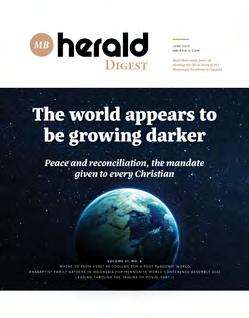
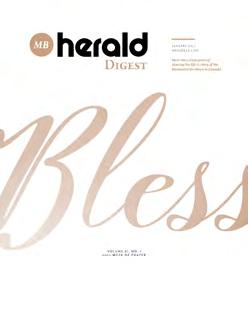
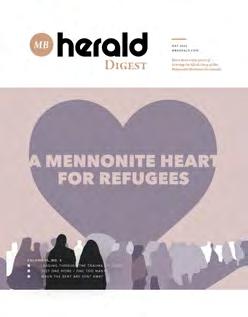
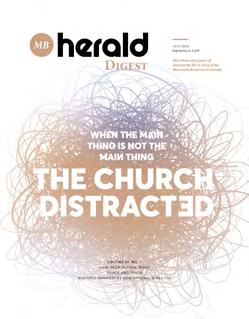
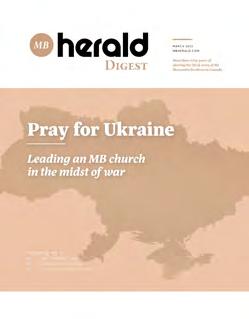

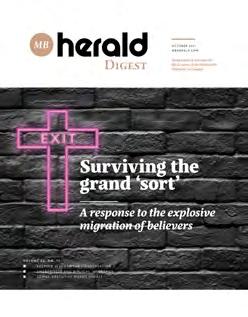

Miriam was born in her parents’ farmhouse in Brotherfield, near Waldheim, Sask., July 12, 1927. She was baptized in the North Saskatchewan River and joined the Brotherfield MB Church Aug. 3, 1941. During her teen years, she was the accompanist for the Brotherfield church choir that her father Peter H. Jantzen directed. After graduation, Miriam attended Saskatoon Normal School and taught in country schools in Saskatchewan for 3 years. In 1950, Miriam moved to Winnipeg to study at a school recognized for its strong music program: MB Bible College. During her 5 years there, she was a member of the Gospel Light Hour radio choir. She became an accomplished musician with the ability to simultaneously conduct and accompany a choir. Upon completion of her studies, she taught music at Rosthern School and Bethany Bible Institute in Hepburn, supplementing her income with private instruction. In 1961, Miriam became a missionary to Paraguay with the Board of Mission of the MB Church (now Multiply). For 5.5 years, she taught music at Asunción Christian Academy, taught music and English privately, led music programs in local churches, and supported the efforts of her co-workers. In 1966, it was her great joy to participate in the annual 5-week teacher training course for Indigenous people in the Paraguayan Chaco when, at their request, music was included in the curriculum for the first time. Her report on that experience in the MB Herald (March 11, 1966) states: “I have never had a pleasanter teaching experience.” In both 1973 and 1974, Mariam spent the summer in Panama, teaching voice and melodica lessons to those who requested music education for their indigenized churches in the jungle province of Darién. She said, they would sing together “1 to 2 hours every evening in church. Then they would come to our house to continue.” Miriam also served as the Mennonite chaplain at St. Paul’s Hospital in Saskatoon from 1991 to 2002. Miriam died peacefully at Langham (Sask.) Care Home Jan. 13, 2023 at 95. She was the last family member of her generation, predeceased by siblings Luella, Elizabeth, Edward (Sara Berg), Hanna (Wilfrid Plett), Daniel, Vernon (Dorothy-Jean Fehr), Eva, Bertha.
Birth: July 12, 1927
Birthplace: Brotherfield, Sask.
Death: January 13, 2023
Parents: Peter H. & Maria (Harms) Jantzen
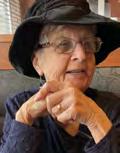
Family: nieces & nephews Archie (Erna), Teresa Forest, Ruth (Thor) Skafte, Geri Yee, Gladys Neufeld (Clayton Beish), Jane Epp, Evanne (Glynn) Linnard, Joyce Janzen, Dan (Christine)
Church: Brotherfield (Sask.) MB; Waldheim (Sask.) MB; Nutana Park Mennonite, Saskatoon
Eva-Marie (Wiehler) Daniel went to her forever home on Sunday Jan. 8, 2023. Later that afternoon, her home was filled with friends and family for 3:00 coffee time. This was always her favourite part of the day, especially when someone came to visit. Eva was born Mar. 4, 1926, in West Prussia. She was the fifth child in a family of 13 kids. After WWII, Eva was sponsored by Mennonite Central Committee to work at a hospital in Pennsylvania for one year. This prepared her for Herbert’s proposal in 1956: “Will you marry me? I’m immigrating to Canada.” She said “Yes!” Canada was full of adventure: getting married within one week of arriving, working at Vancouver General Hospital, moving to North Delta, B.C., building a house, and making a home for her husband and 3 children. Eva was active at Kennedy Heights Church, helping at Pioneer Clubs and always practising hospitality. After the children grew up, she worked at the Fairweather clothing store, learned hairdressing, and then took a longterm care course and worked a few years in a senior care facility. Later she volunteered many years at the MCC Thrift Shop. After her husband’s death in 2012, Eva invited a group of widows from Central Heights Church to her home for coffee every Sunday at 3:00. This tradition continued right until Dec. 18. She lived a long and full life surrounded by people who loved her.
Birth: April 3, 1926
Birthplace: West Prussia.
Death: January 8, 2023
Parents: Richard & Louise Wiehler
Married: Herbert Daniel, 1956 [d. Aug. 3, 2012]
Family: children Evita, John, Doreen (Tim Buhler); grandchildren Daniel (Kristina), David (Nicole), Heidi, James (Melissa), Laura (Zach Janz); 8 great-grandchildren
Church: Central Heights, Abbotsford, B.C.
Baptism: 1939
OBITUARIES HAVE LONG BEEN A VALUED PART OF THE MB HERALD . FROM THE FUNERAL BULLETINS, EULOGIES, AND NEWSPAPER OBITUARIES YOU SEND, OUR EDITORS CRAFT LIFE STORIES OF OUR MEMBERS TO INSPIRE AND ENCOURAGE OUR READERS, CREATING A MEMORIAL OF MB SAINTS. CLICK HERE TO SUBMIT AN OBITUARY
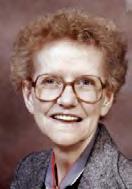
MANITOBA, 1981
Herta Voth dressed in a winter outfit and holding a handful of snow. The caption reads: “Manitoba snow, Christmas 1981.”
Courtesy of the Mennonite Archival Information Database

